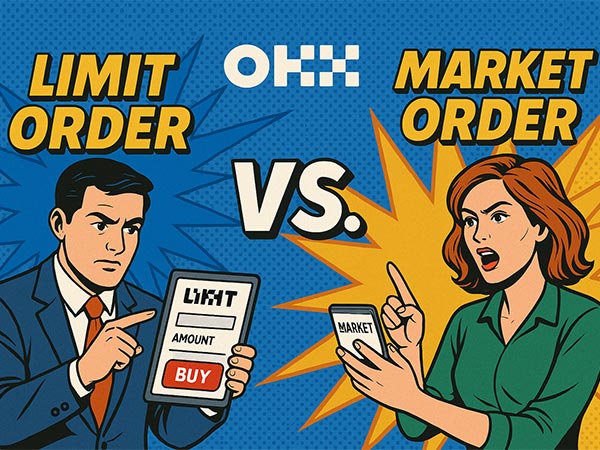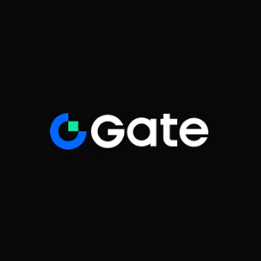OKX Limit Order vs Market Order Full Guide: From Core Concepts to Practical Strategies

Mastering the use of limit orders and market orders is an essential skill for every cryptocurrency trader. As one of the world’s leading digital asset trading platforms, OKX offers a comprehensive order system. However, many users—especially beginners—often find these two basic order types confusing. This guide dives deep into the mechanics of limit and market orders, explains their appropriate use cases, and shows how to operate them effectively on OKX with practical strategies.
Click to view ☞ OKX Welcome Limited-Time Offer, Claim Up to 100 USDT Reward
Market Order: The Tool for Instant Execution
1. Core Logic of Market Orders
A market order is a command issued to the market to “execute immediately at the best available price.” When you select a market buy on OKX, the system automatically matches your order with the lowest ask price available on the market. Conversely, a market sell is matched with the highest bid. The key feature of this order type is speed—execution is typically completed in milliseconds, allowing you to open or close a position instantly.
According to OKX platform data from 2023, the average market order execution time was just 23 milliseconds. In a highly volatile crypto market, this is critical. For example, during a sudden 5% drop in Bitcoin, using a market order can ensure a rapid stop-loss, preventing further losses caused by ongoing price decline.
2. Unique Advantages of OKX Market Orders
OKX’s market order system uses smart routing technology, which scans the market for deep liquidity to ensure optimal execution. Unlike regular exchanges, OKX’s market orders consider:
-
The platform’s internal order book depth
-
Price quotes from partnered liquidity providers
-
Arbitrage opportunities across other exchanges
This multi-source price discovery approach gives OKX an industry-leading advantage in controlling slippage. Tests show that for major pairs like BTC/USDT, a $100,000 market order results in an average slippage of only 0.02%, much lower than the industry average of 0.05%.
3. How to Use Market Orders on OKX
Using market orders on the OKX app takes just a few steps:
-
Enter the trading interface and select "Spot" or "Futures"
-
Choose "Market" under order type
-
Enter the amount to buy (or use the “Amount” mode to enter fiat value)
-
Review the market depth and tap “Buy” or “Sell”
Pro Tip: OKX's “Advanced Market Order” feature lets you set a "maximum order book depth," preventing large slippage in low-liquidity conditions. For instance, you can choose to only consume the top 3 price levels, canceling the rest automatically.
Limit Order: The Art of Precise Price Control
1. How Limit Orders Work
A limit order is placed at a specific price and will only be executed when the market reaches that price. Unlike market orders, limit orders are not immediate—they are placed into the order book and wait for market conditions to match.
OKX’s system uses an advanced price-time priority matching algorithm:
-
For the same price, orders submitted earlier get executed first
-
For different prices, better prices (higher buy/lower sell) are prioritized
2. Top Use Cases for Limit Orders
① Buy Low, Sell High: Place a buy limit order at $38,000 when BTC/USDT is trading at $40,000, waiting for a pullback.
② Scaling Into Positions: Set multiple buy orders at $39,500, $39,000, and $38,500 to build a laddered position.
③ Market Making: Place both buy and sell limit orders to earn the bid-ask spread.
According to OKX’s 2023 Annual Report, 78% of pro traders use limit orders, compared to just 43% of regular users, highlighting the importance of limit orders in precision trading.
3. Advanced Limit Order Features on OKX
-
Post-Only Mode: Ensures your order only acts as a maker to earn rebate fees
-
Iceberg Order: Breaks large orders into small visible pieces to hide actual size
-
TWAP Strategy: Time-Weighted Average Price algorithm executes large orders over time to reduce market impact
Practical Comparison: Limit Order vs Market Order
1. Cost Structure Comparison
On OKX, market orders (taker) incur a 0.1% fee, while limit orders (maker) receive a 0.02% rebate.
For a $100,000 trade:
-
Market Order Cost: $100,000 × 0.1% = $100
-
Limit Order Rebate: $100,000 × 0.02% = $20 gain
This 0.12% difference is crucial for high-frequency traders.
2. Liquidity Impact
Large market orders consume liquidity and can cause price shifts, while limit orders provide liquidity and help stabilize prices. OKX institutional data shows:
-
A market order over 5 BTC causes an average 0.3% price movement
-
A same-size limit order can add 0.2% market depth
3. Performance in Extreme Market Conditions
During major events like the 2022 LUNA crash:
-
Market order users experienced up to 4.7% deviation from expected price
-
Limit order users maintained full control over their exposure
Smart Order Strategy Combinations on OKX
1. Take-Profit/Stop-Loss + Limit Order
OKX allows conditional triggers that convert into limit orders. For example:
“When BTC > $42,000, sell at $41,950.”
This ensures both trigger timing and controlled price execution.
2. Iceberg Order + TWAP Algorithm
For large trades, you can combine:
① Iceberg orders to hide true order size
② TWAP algorithm to execute over time
③ Dynamic adjustments based on market depth
3. Arbitrage Order Strategy
In cross-market arbitrage:
-
Use market orders to quickly enter on high-liquidity platforms
-
Place limit orders on low-liquidity platforms and wait for execution
-
Automate this strategy using OKX’s API tools
Risk Management and Best Practices
1. Market Order Risk Control
-
Avoid large market orders in low-liquidity conditions
-
Watch OKX’s “Estimated Fill Price” prompt
-
Use “Max Slippage Tolerance” to auto-cancel unfavorable trades
2. Limit Order Optimization
-
Use OKX’s depth chart to select ideal price levels
-
In volatile markets, widen your limit price range
-
Analyze historical data for optimal placement strategies
3. OKX Risk Control Tools
-
Price Alerts: Stay ahead of price swings
-
Demo Trading: Practice strategies risk-free
-
Market Reports: Understand order flow and distributions
Conclusion
Mastering both limit orders and market orders will give you a significant edge when trading on OKX. Remember:
-
Market orders prioritize speed—best for emergencies
-
Limit orders prioritize precision—ideal for strategic execution
-
OKX’s advanced features enhance both order types
Beginners are encouraged to start with demo trading and gradually move to live trades with small amounts. OKX’s educational resources and data tools can accelerate your learning curve. In the 24/7 crypto market, choosing the right order type is often your first step toward trading success.
-
Sign Up

OKX
OKX is a leading global digital asset trading platform offering spot and derivatives services for cryptocurrencies.
-
Sign Up

Binance
Binance is one of the world's largest cryptocurrency exchanges, offering spot, futures, staking, and a wide range of digital asset services.
-
Sign Up

Bybit
Bybit is a global cryptocurrency exchange specializing in derivatives, spot trading, and crypto-financial products.
-
Sign Up

Gate.io
Gate.io is a leading crypto exchange offering diverse trading options, low fees, and strong security since 2013.
